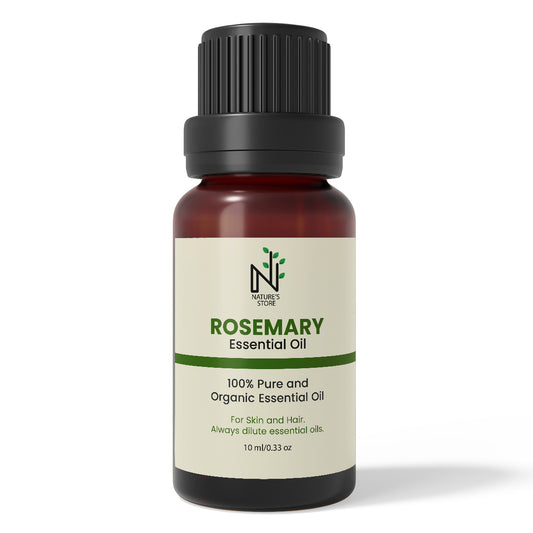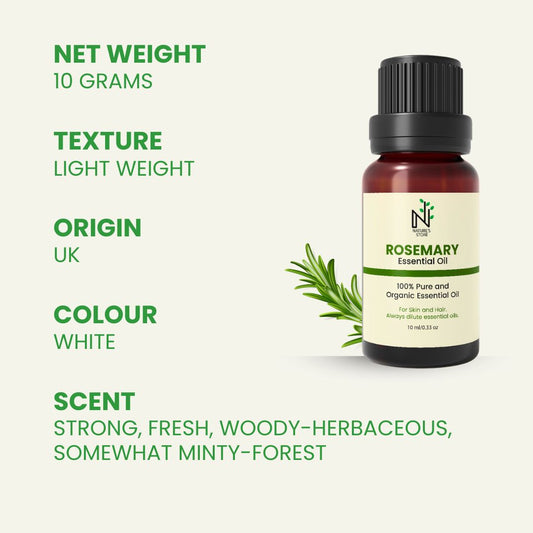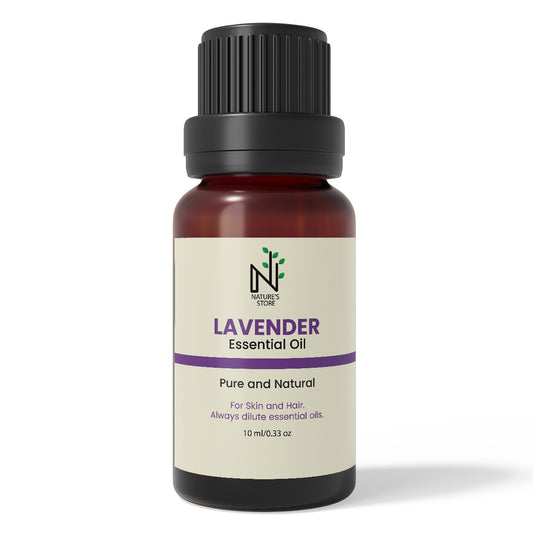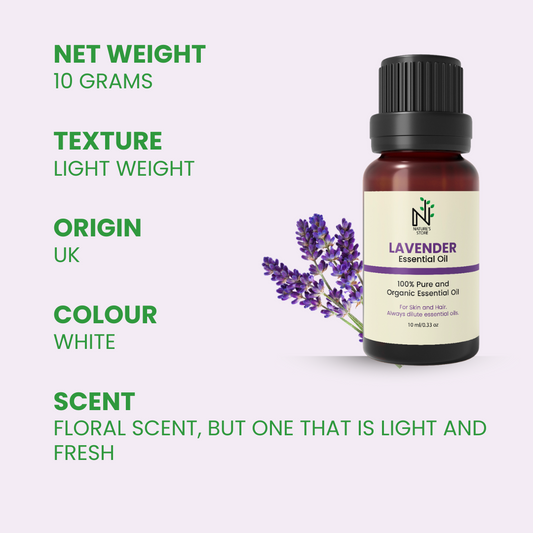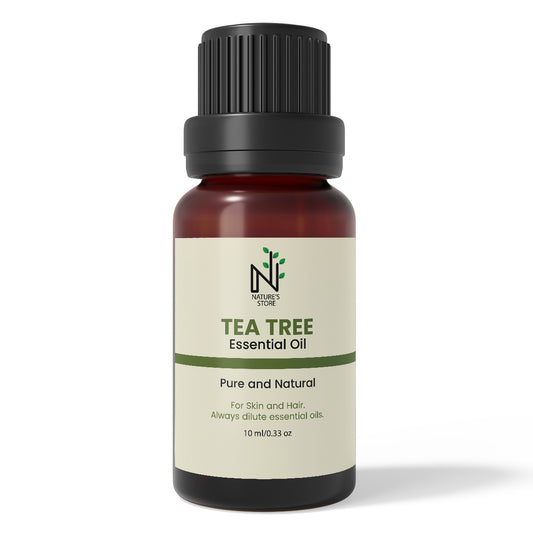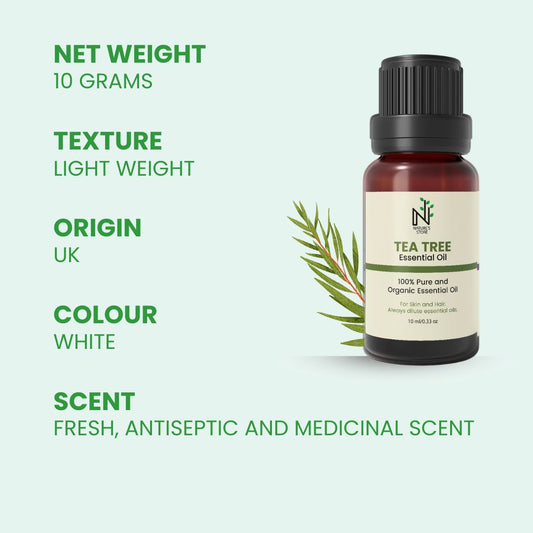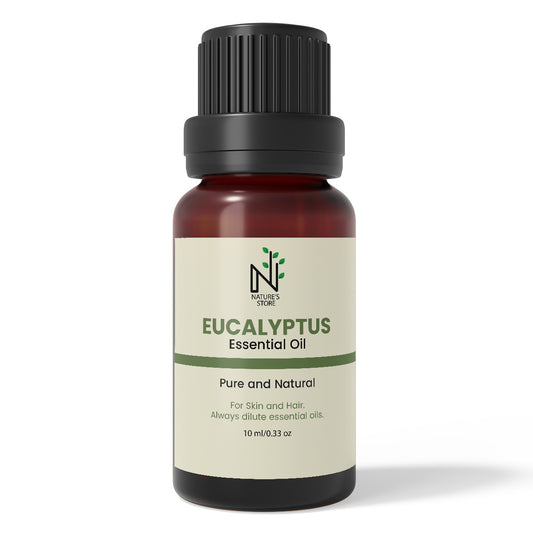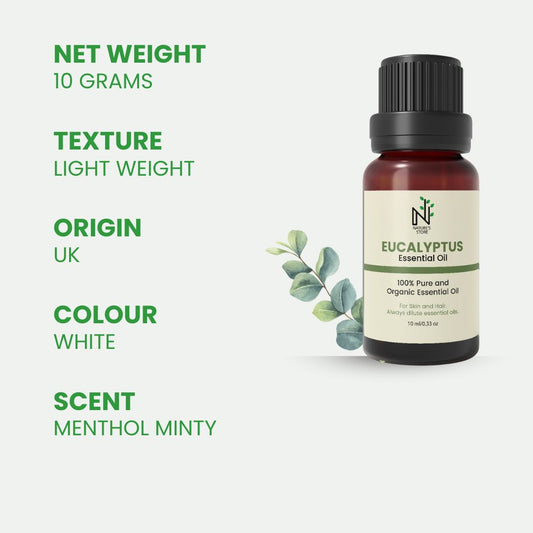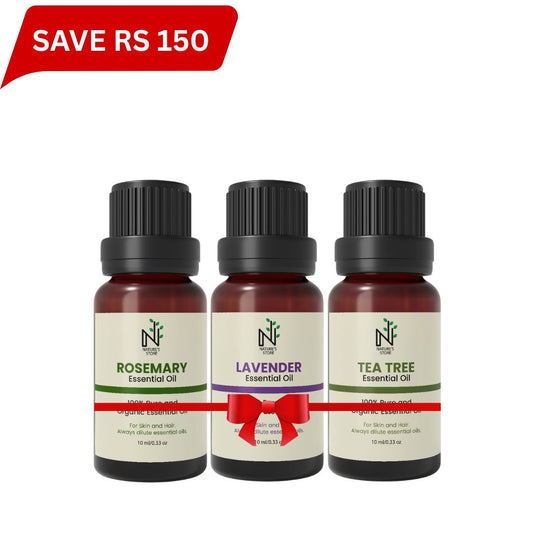-
Organic Rosemary Essential Oil
Vendor:The Nature's Store5.0 / 5.0
(3) 3 total reviews
Regular price Rs.2,100Regular priceUnit price / per -
Pure Lavender Essential Oil
Vendor:The Nature's StoreRegular price Rs.1,550Regular priceUnit price / per -
Pure Tea Tree Essential Oil
Vendor:The Nature's Store5.0 / 5.0
(1) 1 total reviews
Regular price Rs.1,500Regular priceUnit price / per -
Pure Eucalyptus Essential Oil
Vendor:The Nature's StoreRegular price Rs.1,350Regular priceUnit price / per -
Pack of Top 3 Essential Oils
Vendor:The Nature's StoreRegular price Rs.4,450Regular priceUnit price / perRs.4,600Sale price Rs.4,450Sale
Collection: Essential Oil
LIST OF PURE ESSENTIAL OILS IN PAKISTAN
- Rosemary Essential Oil
- Lavender Essential Oil
- Eucalyptus Essential Oil
- Tea Tree Essential Oil
Organic Rosemary Essential Oil:
This is the best Rosemary Oil that you can get from Pakistan. Organic Certified, imported from UK.
Rosemary Oil in Urdu: دونی کا تیل
Pure Rosemary essential oil price in Pakistan:

Benefits of Organic Rosemary Essential Oil for Skin:
(Avoid applying rosemary and other essential oils directly to damaged skin or near sensitive areas, such as your eyes.)
1. Can I use rosemary essential oil on my face?
Yes, you can use rosemary essential oil on your face, but always dilute it with a carrier oil like jojoba, almond, or argan oil. It helps reduce acne, inflammation, and excess oil while improving circulation.
2. Does rosemary oil lighten skin?
Rosemary oil does not bleach or whiten skin, but it may brighten the complexion by improving circulation, reducing blemishes, and clearing acne marks. It promotes an even skin tone over time.
3. What is the difference between rosemary oil and rosemary essential oil?
- Rosemary essential oil is highly concentrated and extracted directly from the rosemary plant through steam distillation.
-
Rosemary oil may refer to essential oil diluted with a carrier oil, making it ready for topical use.
Al
4. Rosemary essential oil benefits for skin whitening
Rosemary essential oil does not all along act as a skin whitener. However, it can be added in creams or oils. It can be tried and tested, however we haven't seen any research on it for skin whitening. Here are some of the benefits discussed on the internet.
- Improves skin tone and brightness
- Reduces dark spots and blemishes
- Fades acne scars and pigmentation
- Promotes natural glow with regular use
5. Rosemary oil on face overnight benefits
Leaving diluted rosemary oil overnight can:
- Reduce acne and breakouts
- Control excess sebum
- Fade dark spots
- Boost skin cell turnover
- Provide a refreshed, glowing look in the morning
Do a patch test first to check for sensitivity.
6. Rosemary essential oil benefits for skin and hair
For Skin: Brightens, reduces acne, calms irritation, evens out tone
For Hair: Promotes growth, prevents shedding, improves thickness, soothes scalp issues
7. Rosemary oil for skin whitening
While rosemary oil doesn’t bleach skin, it helps with spot fading, brightening dull skin, and reducing pigmentation, which can make your skin appear lighter and more even-toned.
8. Rosemary essential oil benefits for skin
Rosemary works well on an acne-prone skin. It helps to treat pimples but make sure it is diluted well. Always patch test before applying anything on your skin or hair.
9. Rosemary essential oil benefits for skin eczema
- Anti-inflammatory properties soothe itching and redness
- Antibacterial effects help prevent infection
- Promotes skin healing and regeneration
Note: Always dilute and consult a dermatologist if you have sensitive skin.
Benefits of Organic Rosemary Essential Oil for Hair:
Rosemary has a lot of hair-related benefits if it is in the purest form. A lot of commercially available essential oils are diluted which is why they don't show any effect on Hair. It helps to control hair fall and increase hair growth. There are a few frequently asked questions related to the benefits of Rosemary essential oil.
1. Can rosemary essential oil help hair growth?
Yes, rosemary essential oil is known to stimulate blood circulation in the scalp, which may promote hair growth and reduce hair thinning. It can also help improve scalp health by reducing dandruff and inflammation.
2. Can I apply rosemary oil directly to hair?
It’s not recommended to apply pure rosemary essential oil directly to your hair or scalp. Always dilute it with a carrier oil like coconut, jojoba, or almond oil before applying to avoid irritation.
3. Can I leave rosemary oil in my hair daily?
You can apply diluted rosemary oil to your scalp daily, especially if your skin tolerates it well. However, start with 2–3 times a week and monitor for any irritation before using it daily.
4. Does rosemary oil whiten hair?
No, rosemary oil does not whiten hair. In fact, it is believed to help darken premature grey hair slightly over time and improve hair pigment retention with regular use.
5. Rosemary essential oil benefits for hair loss
- Strengthens hair follicles
- Improves scalp circulation
- Reduces hair shedding
- May help in conditions like androgenic alopecia
- Natural DHT blocker
6. Side effects of rosemary oil on hair
- Scalp irritation or redness (if used undiluted)
- Allergic reaction in sensitive individuals
- May cause dryness if overused
Always do a patch test before first use.
7. Rosemary oil for hair growth before and after
Many users report noticeable improvements after 3–6 months of regular use. You may observe reduced hair fall, new baby hair, and better hair texture. Consistency is key to seeing results.
8. How to use rosemary oil for hair
- Mix a few drops with a carrier oil like Coconut Oil, Flaxseed Oil, Castor Oil, Almond Oil etc.
- Massage gently onto the scalp
- Leave it for at least 30 minutes or overnight
- Wash off with a mild shampoo
Can also be added to shampoo or hair masks.
9. Rosemary essential oil benefits for hair growth
- Stimulates new hair growth
- Helps revive dormant hair follicles
- Improves scalp health and thickness of hair
- Natural alternative to minoxidil (in some studies)
10. Rosemary essential oil benefits for hair fall
- Reduces breakage and thinning
- Nourishes scalp and strengthens roots
- Antioxidant properties protect against environmental stress
- Fights dandruff and dry scalp – common causes of hair fall
Benefits of Organic Rosemary Essential Oil for Aromatherapy:
Studies suggest it can enhance mood, improve cognitive function, and reduce stress.
Rosemary (Rosmarinus officinalis L.) is a perennial, bushy evergreen shrub native to the Mediterranean region and sub-Himalayan areas. Traditionally used in folk medicine, it has been valued for its antispasmodic and mild pain-relieving properties, and has been used to manage conditions such as intercostal neuralgia, headaches, migraines, insomnia, emotional disturbances, and depression.
Modern research has focused extensively on rosemary’s neuropharmacological potential. The plant possesses notable antimicrobial, anti-inflammatory, antioxidant, anti-apoptotic, antitumor, analgesic (antinociceptive), and neuroprotective properties. Clinically, it has shown positive effects on mood regulation, memory and learning enhancement, pain relief, anxiety reduction, and sleep improvement.
Where to buy rosemary essential oil in Pakistan?
Pure Rosemary Essential Oil is available at The Nature's Store in Pakistan.
BUY NOW
Organic Lavender Essential Oil:
This is the best Lavender Oil that you can get from Pakistan. Organic Certified, imported from UK.
Lavender essential Oil in Urdu: The plant itself is called "حزام" (ḥazām) in Urdu, "لیونڈر کا تیل" is more commonly used when referring to the oil.
Pure Lavender essential oil price in Pakistan:

Benefits of Organic Lavender Essential Oil for Skin:
1. Can I put lavender essential oil on my skin?
Yes, you can! Lavender essential oil is safe for skin when diluted with a carrier oil like jojoba, almond, or coconut oil. It’s gentle and soothing, especially helpful for calming irritation, redness, or minor blemishes. Always do a patch test first just to be sure your skin is happy with it.
2. Is lavender good for skin whitening?
Lavender oil doesn’t "whiten" skin in the bleaching sense, but it can help even out skin tone, reduce redness, and fade dark spots over time. The result? A brighter, clearer complexion that looks fresh and healthy.
3. What are 5 uses for lavender oil?
Lavender essential oil is a true multitasker. Here are 5 popular ways to use it:
-
Calm breakouts – Dab diluted oil on pimples to reduce inflammation
-
Sleep support – Add a few drops to your pillow or diffuser
-
Hair care – Mix into oil masks to promote healthy scalp and shine
-
Bug bites – Soothes itching and irritation
-
DIY body oil – Blend with a carrier oil for post-shower skin nourishment
4. Lavender oil for glowing skin
Lavender oil promotes clear, calm, and healthy-looking skin — all essential for that natural glow. It reduces inflammation, hydrates gently, and helps soothe stressed-out skin, making your face look refreshed and radiant.
5. Lavender oil benefits for skin
Lavender essential oil has a lot of benefits for skin. Here are a few benefits of using Lavender essential oil for skin:
- Calms irritated or sensitive skin
- Reduces acne and breakouts
- Fades blemishes and dark spots
- Helps balance oil production
- Soothes sunburn or redness
- Antioxidants support healthy aging
6. Lavender oil for skin lightening
Lavender oil won’t bleach your skin, but it does help lighten scars, acne marks, and pigmentation with regular use. Over time, it can give your skin a more even, luminous tone.
7. How to use lavender oil for skin
Mix a few drops of lavender oil with a carrier oil like almond or rosehip oil, and gently massage it into clean skin. You can use it in your nighttime routine, or even mix it into your moisturizer or face masks.
8. Lavender oil bad for skin
Lavender oil is generally safe, but using it undiluted can irritate sensitive skin. Some people may experience redness or allergic reactions. Always dilute properly and test on a small area before full use.
9. Lavender oil for face wrinkles
Yes! Lavender oil contains antioxidants that help protect the skin from aging. It also boosts circulation and collagen production, which can reduce the appearance of fine lines and keep your skin looking youthful.
10. Lavender oil benefits for hair
- Promotes healthy hair growth
- Soothes dry or itchy scalp
- Helps reduce dandruff
- Strengthens hair strands
- Leaves hair smelling amazing!
11. Lavender essential oil for acne
Lavender oil is a great natural remedy for acne. It kills acne-causing bacteria, soothes inflammation, and helps heal the skin without overly drying it out — perfect for those dealing with hormonal or stress breakouts.
Benefits of Organic Lavender Essential Oil for Hair:
1. Can Lavender essential oil be used on hair?
Absolutely! Lavender essential oil is safe for your hair when diluted properly. It helps nourish the scalp, reduce dandruff, and can even support hair growth. Plus, it smells amazing and leaves your hair feeling fresh and clean.
2. Which is better for hair growth, lavender or rosemary?
Both oils are excellent, but they work slightly differently. Rosemary is known for stimulating blood flow to the scalp and encouraging faster hair growth — it’s often compared to minoxidil. Lavender, on the other hand, reduces stress and inflammation, which can also contribute to healthier, fuller hair. You can even use both together for best results!
3. Which essential oil is the best for hair growth?
There isn’t one “best” oil for everyone, but some of the top essential oils for hair growth are:
- Rosemary – boosts scalp circulation
- Lavender – calms scalp and encourages growth
- Peppermint – invigorates follicles
-
Cedarwood – may reduce hair thinning
Many people see results by mixing 2–3 of these with a nourishing carrier oil.
4. Does lavender oil really regrow hair?
There’s growing evidence that lavender oil can help promote hair regrowth — especially when hair loss is due to stress, inflammation, or scalp issues. While it may not work overnight, consistent use over a few months can make a visible difference in hair density and texture.
5. How to use lavender essential oil for hair
Mix 3–5 drops of lavender oil with a carrier oil like coconut or castor oil, and massage it into your scalp. Leave it on for 30–60 minutes (or overnight if you like), then wash it out with a gentle shampoo. You can do this 2–3 times a week for best results.
6. Lavender essential oil for hair benefits
- Encourages healthy hair growth
- Reduces dandruff and scalp irritation
- Strengthens hair from the roots
- Adds a natural shine and softness
- Has a calming aroma that reduces stress (which is linked to hair loss)
7. Lavender oil for hair side effects
Lavender oil is generally safe, but using too much or applying it undiluted can cause:
- Scalp irritation or itching
- Allergic reaction in sensitive individuals
- Greasy hair if over-applied
Always dilute properly and patch test before full use.
8. Lavender essential oil for hair growth
Lavender oil supports hair growth by improving scalp health, reducing inflammation, and promoting relaxation — all of which help create the right environment for strong, healthy hair to grow.
9. How to mix essential oils for hair growth and thickness
Here’s a simple blend:
- 2 tbsp carrier oil (like castor or coconut oil)
- 3 drops rosemary essential oil
- 3 drops lavender essential oil
- 2 drops peppermint essential oil
Massage into the scalp, leave for 30–60 mins, and wash out. Use 2–3 times a week for visible results over time.
10. Lavender oil for hair growth before and after
Many users who apply lavender oil consistently (for 8–12 weeks) notice:
- Less hair fall
- Thicker, fuller strands
- New baby hairs growing along the hairline
- Overall improved hair texture
Pairing it with scalp massage enhances the results even more.
Benefits of Organic Rosemary Essential Oil for Aromatherapy:
1. What is lavender oil used for in aromatherapy?
Lavender oil is one of the most popular essential oils in aromatherapy. It's known for its calming, relaxing, and stress-relieving properties. People use it to unwind after a long day, ease anxiety, improve sleep quality, and even reduce mild headaches or tension.
2. Which lavender is best for aromatherapy?
For aromatherapy, Lavandula angustifolia (also known as true lavender or English lavender) is the best choice. It has a soft, floral aroma and the highest levels of calming compounds, making it perfect for stress relief, relaxation, and sleep support.
3. Which essential oil is good for aromatherapy?
Here are some essential oils commonly used in aromatherapy and their benefits:
- Lavender – calming, reduces stress and helps with sleep
- Peppermint – energizing and great for headaches
- Eucalyptus – clears the mind and supports breathing
- Frankincense – grounding and relaxing
-
Lemon or Orange – uplifting and refreshing
It all depends on what you need—relaxation, focus, energy, or a mood boost.
4. How to use 100% lavender essential oil?
Since it's highly concentrated, you should always dilute 100% lavender essential oil with a carrier oil (like almond or coconut oil) for skin use. For aromatherapy:
- Add a few drops to a diffuser
- Put 1–2 drops on your pillow or bedsheet
- Add to bathwater for a relaxing soak
- Mix with water in a spray bottle to use as a calming room mist
Avoid applying it directly to skin without dilution.
5. How to use lavender oil for sleep
To use lavender oil for better sleep:
- Diffuse it in your bedroom 30 minutes before bed
- Place 1–2 drops on your pillow or blanket
- Mix with a carrier oil and apply to your temples, wrists, or the back of your neck
- Add a few drops to a warm nighttime bath to calm your body and mind
Its soothing scent helps relax the nervous system and signals your body it's time to rest.
BUY NOW
Organic Eucalyptus Essential Oil:
This is the best Eucalyptus Oil that you can get from Pakistan. Organic Certified, imported from UK.
The urdu name for Eucalyptus plant is "sufaida or lachi".
Pure Eucalyptus essential oil price in Pakistan:

Eucalyptus Essentail Oil uses:
How to use eucalyptus essential oil for cough
Eucalyptus oil is great for relieving coughs and clearing airways. You can:
- Steam inhalation: Add 3–4 drops of eucalyptus oil to a bowl of hot water, cover your head with a towel, and inhale the steam for 5–10 minutes.
- Diffuser: Add a few drops to a diffuser in your room — it helps loosen mucus and makes breathing easier.
- Chest rub: Mix a few drops with a carrier oil (like coconut oil) and gently rub it on your chest and throat for relief.
Eucalyptus essential oil for congestion
Eucalyptus oil is well-known for clearing nasal and sinus congestion. It works as a natural decongestant:
- Use in a diffuser or steamer to open up blocked sinuses
- Add to your bath for a soothing, steam-infused effect
- Or make a quick DIY vapor rub with eucalyptus + carrier oil and apply around the nose and chest (avoid getting too close to the nostrils)
Eucalyptus essential oil for sauna
Yes — eucalyptus oil is perfect for the sauna! Just add a few drops to the water bucket used for splashing on the hot sauna stones. The heat releases the oil’s vapor into the air, creating a refreshing, invigorating atmosphere that helps open airways, boost circulation, and relax muscles. Start with 3–5 drops per ladle of water.
Eucalyptus essential oil for baby
Use caution with eucalyptus oil on babies. For children under 2 years, it’s best to avoid direct use of eucalyptus oil — it can be too strong for their developing respiratory system.
For older babies (2+ years):
- Use in a diffuser (1–2 drops, well-diluted in water) for a short time in a well-ventilated room
- Never apply directly to their skin or under their nose
- Always consult a pediatrician before using essential oils for babies
Eucalyptus essential oil for dogs
Eucalyptus oil can be used cautiously with dogs, but only in very small, diluted amounts and with veterinary guidance. It may help with fleas or skin irritation, but it can also be toxic if ingested or inhaled in strong concentrations.
- Never apply directly on your dog’s skin without dilution
- Never use near their nose, mouth, or eyes
- Avoid diffusing in small, enclosed spaces where your dog can’t leave
Always check with a vet before using any essential oil on pets.
Eucalyptus essential oil for cats
Avoid using eucalyptus oil around cats. Cats are very sensitive to essential oils, and eucalyptus—whether diffused, applied, or even just inhaled—can be toxic to them. It may cause symptoms like drooling, breathing issues, lethargy, or worse. Always keep essential oils stored securely and avoid diffusing them in areas where your cat sleeps or eats.
Eucalyptus essential oil for spiritual benefits
Eucalyptus has long been used for its cleansing and protective energy in spiritual and healing practices. Some of its spiritual benefits include:
- Clearing negative energy — perfect for smudging or space cleansing
- Promoting clarity and focus — often used in meditation or mindfulness rituals
-
Uplifting the spirit — its refreshing scent can help reset your mood and create a sense of renewal
You can add a few drops to a diffuser during meditation, mix it into a spray for aura cleansing, or use it in a bath to energetically refresh your body.
Benefits of Organic Eucalyptus Essential Oil for Skin:
1. Can I put eucalyptus essential oil on my skin?
Yes, you can — but only when diluted with a carrier oil like coconut, almond, or jojoba oil. Eucalyptus oil has antibacterial and anti-inflammatory properties, which can be great for acne-prone or irritated skin. Just make sure to patch-test it first, especially if you have sensitive skin.
2. Does eucalyptus essential oil lighten skin?
Eucalyptus oil doesn’t "whiten" skin in the bleaching sense, but it helps clarify and even out your skin tone by fighting bacteria, reducing inflammation, and clearing up breakouts — which can make your skin look brighter and fresher over time.
3. What are the side effects of eucalyptus oil on the skin?
If used undiluted or too often, eucalyptus oil can cause:
- Skin irritation or redness
- Burning or stinging sensation
- Allergic reactions in sensitive skin
Always dilute it and avoid using it on broken or very sensitive skin.
4. Can I put eucalyptus oil on my pimple?
Yes — eucalyptus oil has antibacterial properties that can help reduce the size and redness of pimples. Just dilute it with a carrier oil, dip a clean cotton swab into the mix, and dab it directly onto the pimple (not your whole face). Avoid if your skin is overly dry or sensitive.
5. How to use eucalyptus oil on skin
- Mix 2–3 drops of eucalyptus oil with 1 tablespoon of a carrier oil
- Apply it to clean skin (spot treatment or lightly over affected area)
- Avoid the eye area and rinse off after 15–20 minutes if your skin feels sensitive
You can also add it to your clay masks or bathwater for full-body benefits.
6. How to use eucalyptus oil for skin lightening
While it won’t bleach the skin, eucalyptus oil helps reduce acne marks and clear clogged pores, which can improve overall brightness. Mix a few drops with rosehip or sweet almond oil and use it as a night treatment or in a weekly face mask.
7. Eucalyptus oil benefits for skin and hair
Skin:
- Fights acne-causing bacteria
- Reduces inflammation and redness
- Soothes minor skin irritations and rashes
- Improves skin clarity and texture
Hair:
- Clears dandruff and dry scalp
- Promotes a healthier scalp environment
- May help reduce itchiness and buildup
- Leaves hair feeling clean and refreshed
8. Eucalyptus essential oil benefits
- Antibacterial and antifungal
- Relieves congestion and boosts breathing
- Reduces muscle tension and joint pain
- Supports mental clarity and focus
- Great for skin issues like acne, rash, or oily skin
9. How to dilute eucalyptus oil for skin
A safe ratio is:
- 1–2 drops of eucalyptus oil
- Mixed with 1 tablespoon (15 ml) of a carrier oil (like coconut, jojoba, or olive oil)
For sensitive skin, start with 1 drop and increase if no irritation occurs. Avoid using near eyes or mucous membranes.
10. Eucalyptus oil for skin rash
Eucalyptus oil can help calm mild rashes or itchy patches because of its cooling and anti-inflammatory properties. Just dilute it well and apply to the affected area. Avoid using it on broken or severely inflamed skin, and if the rash worsens, stop use immediately.
Benefits of Organic Eucalyptus Essential Oil for Hair:
1. Is eucalyptus essential oil good for hair growth?
Yes, eucalyptus oil can support healthy hair growth! It helps stimulate the scalp, improve blood flow to hair follicles, and reduce scalp issues like dandruff — all of which contribute to stronger, healthier hair over time.
2. What are the disadvantages of eucalyptus oil for hair?
If not used properly, eucalyptus oil can:
- Cause scalp irritation or burning
- Dry out the scalp if used in high concentration
- Trigger allergic reactions in sensitive individuals
That’s why it’s important to always dilute it before use and avoid over-application.
3. What essential oil grows hair the fastest?
Rosemary essential oil is widely considered the most effective for fast hair growth — studies even compare it to minoxidil. Peppermint is another strong contender, known to increase blood circulation to the scalp. Eucalyptus works well too, especially when combined with other oils.
4. Is peppermint or eucalyptus better for hair?
Both are great, but for different reasons:
- Peppermint oil is better for boosting hair growth and increasing scalp circulation.
-
Eucalyptus oil is ideal for a healthy, clean scalp and reducing buildup, dandruff, or itchiness.
Use them together in a diluted blend for the best of both worlds!
5. How to use eucalyptus essential oil for hair
- Mix 3–4 drops of eucalyptus oil with 2 tablespoons of a carrier oil (like coconut or castor oil).
- Massage into the scalp for 5–10 minutes.
- Leave it on for 30–60 minutes before washing with a mild shampoo.
You can also add a couple of drops to your shampoo or conditioner for a refreshing boost.
6. Eucalyptus essential oil for hair side effects
Possible side effects include:
- Scalp tingling, burning, or redness if undiluted
- Dryness or flaking if used too often
- Rare allergic reactions (always do a patch test first)
It’s safe when diluted and used 1–2 times per week.
7. Side effects of eucalyptus oil on hair
While eucalyptus oil doesn’t damage the hair shaft, overuse or poor dilution can cause:
- Dry, brittle hair
- Scalp irritation
- Increased sensitivity to sunlight (photosensitivity in rare cases)
Stick to proper dilution, and always moisturize after.
8. Eucalyptus essential oil for hair overnight
Yes, you can leave eucalyptus oil in your hair overnight — only if it’s well diluted. Mix it with a nourishing base oil like castor or argan oil, apply it to the scalp, and protect your pillowcase. Wash it out in the morning with a gentle shampoo.
9. Can I leave eucalyptus oil in my hair overnight?
Yes, but proceed with caution. Make sure it’s diluted with a carrier oil, and test it during the day first to ensure your scalp doesn’t react. If your scalp feels tingly, itchy, or warm for too long, it’s best to rinse it out earlier.
Benefits of Organic Eucalyptus Essential Oil for Aromatherapy:
1. What is eucalyptus oil used for in aromatherapy?
Eucalyptus oil is widely used in aromatherapy for its refreshing, clearing, and energizing effects. It helps open up the airways, improve breathing, clear mental fog, and uplift your mood — making it great for when you’re feeling congested, sluggish, or stressed.
2. Is eucalyptus oil safe to inhale?
Yes — inhaling diluted eucalyptus oil is safe for most adults, and it’s actually one of the most common essential oils used for steam therapy.
3. Can you put 100% eucalyptus oil in a diffuser?
Yes, you can! Most essential oils, including 100% pure eucalyptus oil, are meant to be added directly to a diffuser. Just use 3–5 drops in water (follow your diffuser's instructions).
4. How to use eucalyptus oil for steaming
For steam inhalation:
- Boil water and pour it into a bowl
- Add 3–4 drops of eucalyptus essential oil
- Place your face over the bowl (keep a safe distance)
- Drape a towel over your head and inhale the steam for 5–10 minutes
This is great for relieving nasal congestion, cough, or sinus pressure.
BUY NOW
Organic Tea Tree Essential Oil:
This is the best Tea Tree Oil that you can get from Pakistan. Organic Certified, imported from UK.
Tea Tree Oil in Urdu: روغن ٹی ٹری
Pure Tea Tree essential oil price in Pakistan:

1. How to use tea tree oil on your face directly
Tea tree oil is very potent, so you should never use it on your face without diluting it first. Mix 1–2 drops of tea tree oil with a teaspoon of a gentle carrier oil.
2. Tea tree oil for skin whitening
Tea tree oil doesn’t whiten skin in the traditional sense, but it can brighten your complexion by reducing acne, clearing blemishes, and calming redness.
3. Does tea tree oil kill fungus on skin?
Yes, tea tree oil is antifungal and can help treat mild skin fungal infections.
4. Tea tree essential oil benefits
- Fights acne and blemishes
- Helps reduce inflammation and redness
- Has antibacterial and antifungal properties
- Supports clearer, healthier skin
5. Tea tree oil side effects
While it’s natural, tea tree oil can cause:
- Skin irritation or burning (especially if undiluted)
- Dryness or peeling in some users
- Allergic reactions in sensitive skin
6. Tea tree oil uses for hair
Tea Tree helps to Soothe dry or itchy scalp. It also fights dandruff.

